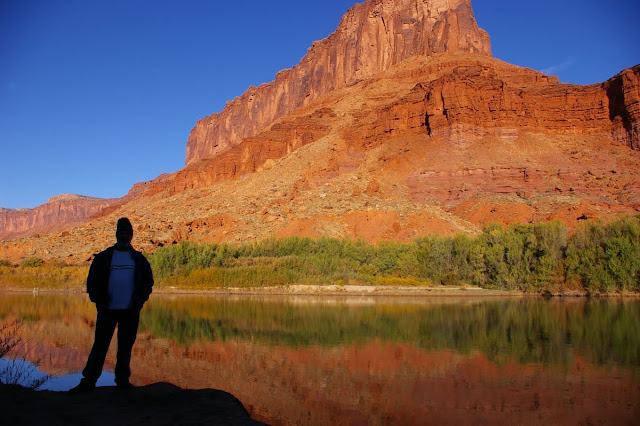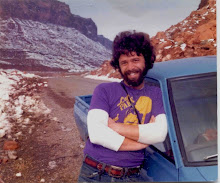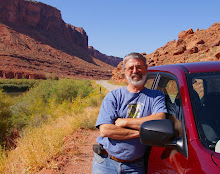It was over
45 years ago that I blew into this bizarre and beautiful place to begin one of
the most extraordinary periods of my life.
I was young and fearless and full of energy when I started my tenure as
a park ranger in the Needles District of Canyonlands National Park. That was back in October of 1974. And now I am back again, under a tangle of
trees in campsite A7 in Squaw Flat.
Wooden Shoe Butte dominates the eastern landscape spreading its
tentacles of sandstone in all directions, into the drainages of Squaw Canyon
and Lost Canyon and the very edges of Salt Creek. The almost holy silence here is broken
occasionally by a squawking raven or a desperate visitor looking for a camp
site. I grabbed the very last one this
morning at 930am.
 And that
was after a full bore drive down highway 211, passing cars at every opportunity
in hopes of finding a site. It helps to
have driven this road three or four hundred times over the years, knowing every
curve and canyon, recognizing individual cottonwood trees and petroglyph
panels. It begins at Church Rock
junction with a long open stretch through overgrazed grass and sagebrush, the
long climb to abandoned Ogden Center and through Photographers Gap, then down
toward the drainage from Harts Draw and the flanks of the Abajo Mountains. The section down the Dugway is steep and
curvy and used to be treacherous in the winter months. A few errant ponderosas have taken root in
the Navajo sandstone. Just beyond the
switchbacks Indian Creek flows in from the south to give the canyon its name
and character.
And that
was after a full bore drive down highway 211, passing cars at every opportunity
in hopes of finding a site. It helps to
have driven this road three or four hundred times over the years, knowing every
curve and canyon, recognizing individual cottonwood trees and petroglyph
panels. It begins at Church Rock
junction with a long open stretch through overgrazed grass and sagebrush, the
long climb to abandoned Ogden Center and through Photographers Gap, then down
toward the drainage from Harts Draw and the flanks of the Abajo Mountains. The section down the Dugway is steep and
curvy and used to be treacherous in the winter months. A few errant ponderosas have taken root in
the Navajo sandstone. Just beyond the
switchbacks Indian Creek flows in from the south to give the canyon its name
and character.
A thick
canopy of trees heralds Newspaper Rock and forms an arboreal tunnel for several
miles as the canyon walls stay close.
Here and there an etched big horn or shaman figure show themselves on a
sandstone wall. As the canyon widens,
the trees stay with the creek while the road meanders along the base of high
red cliffs. The sky opens up, the
sandstone pulls away, and the cattle appear around the grasslands near the
Dugout Ranch. The first signs of
historic humanity for several miles. I
could finally put the pedal to the metal on the Subaru and make like lightning
for the campground where I felt welcome and secure.
Little
Spring Canyon welcomed me back again as well after a hiatus of many years. My secret place, private getaway, and
pleasuring ground is harder for a 69 year old man to get into than a 29 year
old but I managed. I kept thinking that
this would probably be my last shot at it so I was determined to make it at
least as far as the first set of springs under the cottonwood gallery
downstream. Having a walking stick
really helped but I still stumbled and bumbled my way over the hard gray
limestone and the crumbling weathered sandstone shelves. I bouldered down a small pour off and
squeezed through a rocky tunnel before reaching the edges of the canyon where I
descended on an old deer trail to the sandy floor.
The
memories came flooding back even before I had reached level ground. I recognized an old juniper snag, little
changed in four decades. I remembered
the first time Susan and I discovered this place, in the dead of winter no
less. Frozen formations of ice along the banks portended bubbling pools in the
spring. And so it was. By mid May there was lots of cold, fresh
water seeping to the surface at the cottonwood gallery, then trickling on down
the canyon in a series of pools, cascades and freshets. Places to soak a naked body. Places to make love in utter privacy and openness.
There
was the time that Phil and I ingested some mescaline and spent a very long day
hiking downstream as far as we could, to the imposing confluence of Big Spring Canyon
and then to the even more imposing confluence
of Salt Creek. We traversed
ledges full of fossil crinoids and brachiopods.
We walked through dark polished halls of limestone. We thought we could walk all the way to the
Colorado River but we eventually got rimmed out. And then we hiked all the way back to the
front country. All in one unbelievable
day.
There
was the time Cindy and I got caught in a savage rainstorm near the confluence
of Big and Little Spring and hiked like hell to find shelter high above the
creek. I was expecting a flash flood
that never came, but we spent a primal night in a large alcove above the
springs, firelight flickering off of walls like a Pleistocene parlor.
One
summer Mary Ann and I discovered a cache of ancient puebloan artifacts near the
first spring. There were several
arrowheads, part of a woven yucca sandal, a ringlet of pressed desiccated
flowers, an arrow shaft. We stashed it
all back where it came from. I looked
for it today but there are only a few flaked lithics left at the site. For years we swore ourselves to secrecy that
we would never mention the name of the place.
But people are still getting down there even though the canyon is not
marked nor advertised.
Yet
today it did, indeed, seem to welcome me back.
The springs are not as vigorous as they used to be. Clean, fresh water no longer bubbles out of
the ground. Instead there is a much
smaller seep that feeds the creek with a shallow, algae lined run. Maybe the water table has dropped. Maybe too much water has been diverted over
the years to keep the thirsty campers happy.
Maybe as with me, age has taken a certain toll. In any case, the big cottonwoods
still hold sway. They were all shades of
gold and yellow today and huddled together thickly downstream, a riparian
fortress I could not break through.
But none
of that truly mattered. I had made it
back. And I made it back out as
well. And I am grateful to be among a
probable handful of people who have really experienced this place...and maybe
it has become a secret place for them as well.
If there ever was an Eden it must have been very much like this hidden
garden in the midst of a wilderness of stone.
I grow older and less able but the canyon remains and I know it is still there and still vital, and
that's good enough for me.





No comments:
Post a Comment